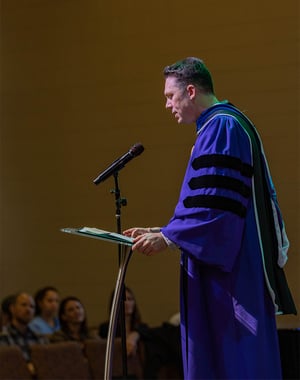Excellent Teaching in Christian Community: Love and the Restless Heart Syndrome, Part Two
| Mission
 The text below is part two of a message presented at the undergraduate teaching excellence chapel, a celebration of Trevecca’s high standard of excellence in teaching.
The text below is part two of a message presented at the undergraduate teaching excellence chapel, a celebration of Trevecca’s high standard of excellence in teaching.
Higher education institutions are experiencing pressure on every side to become excellent, often by how effectively we can infect students with the restless heart syndrome. We measure excellence according to metrics like ‘return on investment’ and ‘job placement rates.’ And again, my argument isn’t that job placement is a bad thing, but so far, I’ve yet to discover the job that, on its own, can satisfy my restless heart. In honesty, I think I resonate so much with Augustine, who said, “our hearts are restless until they rest in you,” because I’ve found in his story a pattern of my own, questing after the next finite achievement just over that elusive horizon. To some degree, I think I have higher education institutions to blame for a piece of this. They’ve introduced to me a vision of possibilities I couldn’t have ever imagined, complete with a ranking system, GPA, test scores, scholarships, and awards, all offering a serpentine lie that the more I achieve, the more satisfied I’ll be.
But gladly, it was Christian higher education that also offered the gift of envisioning achievements and jobs for what they are: finite goods. Augustine had Ambrose, a teacher who helped him come to this realization. I had people like Michael, Herb, Helen, Doug, Judy, Ron, Steve, Jack, and Brent – all excellent teachers who have modeled for me a vision of education that serves something beyond finitude. They are gifted educators who were able to help me learn content and develop skills, while also offering a vision of who I could do with that content and skills that moved to the rhythms of prayers that became my heartbeat: “Your kingdom come, your will be done, on earth as it is in heaven.”
Christian higher education isn’t just the same content you can get at a state school with a Bible verse tacked on. It’s the nuanced development of an imaginative vision for how one might use content and skills in ways that offer a home to restless hearts.
Here’s a snapshot of what I think that might look like around places like Trevecca: Some students who enroll in my Christian Tradition course aren’t shy about telling me that their lack of excitement for that course is linked to the perception that it “doesn’t apply to their major.” It’s a course in history and doctrine, after all, and they are at a university to become a medical professional, business professional, or educator, so how will any of this apply to the skills they’re developing in their other courses? I tend to agree with them. Taking a course like mine isn’t meant to apply to their major – it’s meant to make sense of their major. At heart, I want a course like that to give them a story to locate their work as a teacher, nurse, or entrepreneur that will allow them to live life on mission, and to take what we’ve given them and how to know how to aim it in service to an infinite kingdom where the poor are blessed, the mourners are comforted, and the meek inherit the earth. Among the thousands of colleges and universities that are offering really good training and delivering really good content, Christian higher education gets to offer that training and content with a vision of how to use it in ways that are for more than the job itself, but for the distinct, colorful, beautifully offbeat, particular kingdom that Jesus established. Christian communities are those that get to point to something truly unique in the world – like the kingdom where the poor are blessed and the meek inherit the earth – and say, “Let’s use this training to do that really well.”
I’m really thankful for teachers who have taught me a way beyond the restless heart syndrome, and I’m really thankful for places where teaching like that can be called excellent.
Further reading:
Anthony T. Kronman, Education’s End: Why Our Colleges and Universities Have Given Up on the Meaning of Life (2008).
James K.A. Smith, Desiring the Kingdom: Worship, Worldview, and Cultural Formation (2009).
John Wesley, “The More Excellent Way” in John Wesley’s Sermons: An Anthology (1992).
